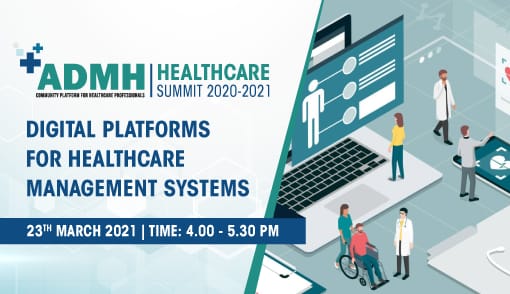ADMH’s Healthcare Summit 2020-2021 on ‘Digital Platforms for Healthcare Management Systems’ was held on 23rd March 2021. The leading industry experts on the ADMH’s platform delved into the discussion of how Healthcare Management Systems (HMS) could change the dynamics of patient care and experience. It also focused on how HMS can be propagated and enhanced for front-office work in hospitals and clinics. With HMS, patient records can be made more efficient, accessible and secure.
The panel was moderated by Kishor Gojiya, IT head at CIMS Hospital in Ahemdabad and comprised of Dr. Anupam Karmakar, CEO and MD at SPF’s Hira Mongi Navneet Hospital, Ankit Shah, CFO at Omni Hospitals, Suresh Nadar, Group CIO at Dr. Batra’s Group and Vishal Gupta, Advisor, Digital Health at National Digital Health Mission.
The enlightened panel discussion commenced when the moderator for the event, Kishor Gojiya, IT head at CIMS Hospital gave a background on HMS and asked the esteemed speakers to share their views on the smooth functioning of HMS by being patient-centric.
Suresh Nadar, Group CIO at Dr. Batra’s Group shared his opinions on the topic by saying, “Software should be built around a patient as the main purpose is to store their data. Post pandemic, many patients have been transitioning to online consultation and that’s where HMS plays an important role.” He said that in order to enhance the patient experience, continuous communication is the key. “The choice should be with the patient. Through HMS, they should be able to decide the way they want to consult the doctor”, he added further.
Speaking about how HMS enables hassle-free patient care, Dr. Anupam Karmakar, CEO and MD at Hira Mongi Navneet Hospital said, “ The system is the backbone as it stores all the data of the patient. This data will provide us with all the necessary things we need to know about the history of the patient.” He emphasized the importance of clinical data and how it eases patient care. He continued, “Follow up and other activities get reduced when the patient comes again if the hospital has an updated HMS in place.”
Delving into the discussion further, Ankit Shah, CFO at Omni Hospitals talked about the ways in which HMS could be optimized for coherent use. He said, “HMS is the heart and soul of the entire healthcare architecture whether it is online or offline. In terms of utilizing it with respect to patient’s data, research and cross optimization, there is a lot we need to do.” Providing deep industry insights, he added, “Adding applications and platforms can help in improving efficiency. We need to evaluate various cloud computing approached as this can help in improving end-user delivery and experience.”
Adding to the discussion, Vishal Gupta, Advisor, Digital Health at National Digital Health Mission distinguished between the various types of HMS platforms that are widely used globally in the field of healthcare. He said, “HMS is a very unique practice and our country needs it. Different types of HMS in the market are-
- Electronic Medical Record (EMR) – These platforms often means word or excel based software which is used to manage records.
- Electronic Health Record (EHR) – All records in the EHR are maintained according to the standards given by the government.
- Public Health Record (PHR) – These are the health records of a citizen that can be accessed and controlled by them whenever they want to. “
The panel discussion came to a conclusion that HMS has changed the dynamics of healthcare and patient experience in today’s healthcare scenario. It was also concluded that rather than being viewed as a back-office system, it should be looked at as a clinical information system in India in order to reap the numerous benefits of HMS.







